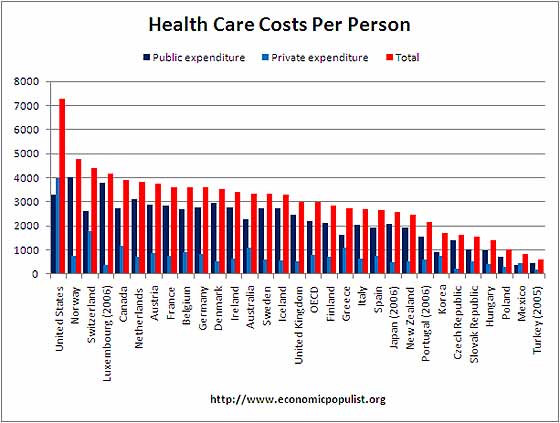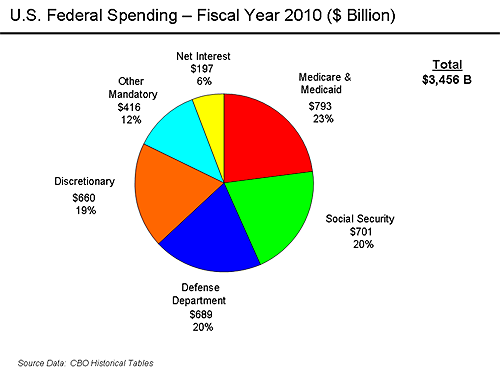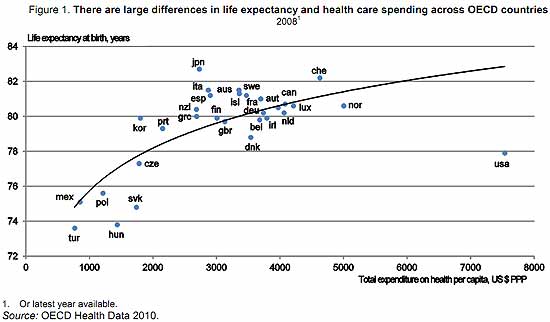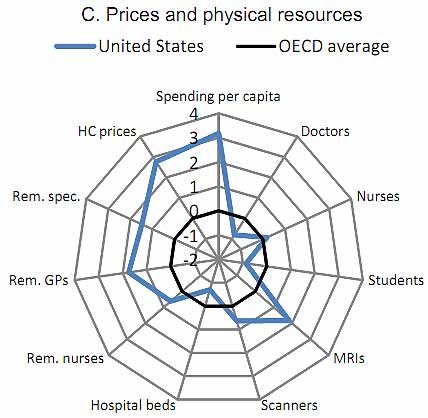With the never ending pundit pontificating on the budget deficit and how we must cut spending, it seems always the bulls-eye is on the backs of the U.S. middle class, poor and national interest. Yet, even the Wall Street Journal notes health care costs are out of control. In their number of the week, they amplify the U.S. Spends 141% More on Health Care than other nations.

Source: OECD
141%: How much more the U.S. spends on health care, per person, than the average OECD nation.
At a time when politicians in Washington are battling over — among other things — the future of the U.S. health-care system, it’s instructive to see just how well that system operates. According to the Organization for Economic Cooperation and Development, we’re doing a terrible job.
141%, that's an astounding number, as illustrated by the above graph. The health care comparison report WSJ refers to is this one. The United States is the most inefficient health care system of all of the OECD countries. Regardless whether a health care system is public, private or a mix, the U.S. is plain getting ripped off and inefficient as hell to boot.
The CBO shows health care costs increasing as part of the federal budget. The White House budget for 2012 shows health the largest of all expenses, at 22.62% of the 2012 budget. See how much Medicare and Medicaid is, from the percentage breakdown for fiscal 2010 spending.

Below is an OECD graph on health care costs versus life expectancy. As we can see, the United States is off the charts in terms of costs versus what we're getting.

We live less, yet pay more, which is more amazing because frankly, once you're dead, you no longer are paying for health care. The chart below is from the OECD health care efficiency report on the United States. The numbers below the black circle mean the United States is below other nations, the numbers above the black circle mean the United States is higher than other nations. On the left are prices, on the right are supply.

Notice on Health Care costs (HC) is off the chart on the above graph as are other costs. We're simply paying way more per service than other nations, yet getting way less.
The department of Health and Human Services gives the breakdown in Medicare spending for fiscal year 2010:
As we can see, drugs are a huge percentage of the budget! Medicare only covers those age 65 and over, so one would think nursing homes, hospice, home health services would be much more expensive. Instead prescription drugs are over 13%. Could that be due to the United States having the highest prescription drug prices in the world? One must wonder how many of these drugs are even necessary. Anyone watching television or opening up a magazine knows expensive drugs are pushed on people 24/7, with side effects such as death listed in the fine print. How much of this Medicare expense is simply to increase profits of pharmaceutical companies, versus any real service to citizen's overall health?
This is just one example. While corporate lobbyists turn America's ire on Obamacare, their solutions are usually worse. In spite of all of the rancor since 2008 and major legislation passed, the reality is we simply do not have health care reform that will increase efficiency, serve all Americans and lower costs.
Fundamentally this is part of the problem. The statistics and numbers tell all, yet are continually buried to never see the light of day. Instead of drilling down deep into the U.S. health care system inefficiencies and rip offs, politicians, pundits and the press continually misdirect the public discourse into vague sounding, meaningless terms which do not solve problems.
You want to solve the budget crisis? Get corporate lobbyists out of D.C. and the first place to start is with the American health system. It is not Obama who will destroy the financial health of the nation, or even tea partiers. It is corporate lobbyists who will bankrupt the nation by getting their way, every time, subverting the public good.

Comments
Bravo!!!
While people forgo medication and services, the economics of healthcare get crazier. This is a criticl article that points to the need for rational analysis. If you break down health care costs by function, the inflation is not nearly as bad as the aggregate. But that's not done. This presentation shows that we're well beyond fiddling around, as Obama did. First stop: medication prices. Nationalize these firms, period. They aren't nearly as brilliant as they claim and their pricing will kill more people than their drugs will cure.
Great article.
Michael Collins
Åll Our Sacrifice, For Nothing
All the cuts by all levels of government -- even the trillion dollar ones -- mean nothing, as healthcare costs continue to eat us alive. For more than 10 years, every year they leap up to another unprecedented level and there are thousands of articles like this written about it.
Just like all those other years, this year most people will find their raises at work are less than the rate of inflation because their companies had to kick in another $500 for individual and another $1,000-$1,800 for family coverage.
And on top of that, if they read their healthcare signup packages, they'll see their payroll deduction for insurance has increased enough to wipe out much-most-all of their aftertax raises. Chances are that they'll find at least one thing that what was covered last year no longer is, or at a much lower rate of reimbursement.
And yet -- and yet -- I don't hear many howls of protest, do you? Those we do hear are often from businesses, not the employees. I don't know why, really.
My best guess is that despite all the information out there, most Americans feel nothing can be done.
They practice selective deafness.
We've all grown up hearing that we have the best medical care in the world. The older folks have heard about the perils of socialized medicine for decades and pass the dire warnings on to the younger generation without really knowing what they're talking about.
Then of course as you point out, there's all kinds of pressure from the many beneficiaries of the current system for us to keep on doing what we're doing.
But with the selective deafness in effect, people don't make the connection between their stagnant wages and increasing insurance costs. They don't say to themselves "we can't go on like this, we have to find another way." All the facts and figures about doing things another way -- all the evidence from abroad where people are happy with their systems, where private insurance companies still exist in national health plans, from our own experiences of Medicare's low administrative costs -- so far have come to nothing.
They just don't make it through the collective resistance in the American consciousness.
I hope to God this changes because if it doesn't, we're sunk as a First World nation. We cannot sustain a First World life for most Americans while we pay so much for healthcare as well as interest on the debt that our out-of-control healthcare costs will lead us to incur. That probably would have been true regardless. God knows the last 30 years of mass migration of low income immigrants and our subsequent much higher population of needy people makes that a dead certainty now.
America does not have the best health care in the world
not by a long shot. We have people going as medical tourists to get operations in India, but even by "1st world" countries we're coming down in the bottom.
That's one of my points, you cannot even get basic facts out there, understood on U.S. health care. The lobbyists won't allow it.
I Know: We Should, But We Don't
It's a crying shame.
So many new drugs and medical breakthroughs originate here but so many don't even have coverage.
I am afraid I cannot agree that the lobbyists are entirely to blame. There's the resistance that I outline above. The employed and the retired focus on keeping what they have (although there are some big holes in that too, especially things like private coverage of mental health) instead of what they could have and should have -- them and everybody else.
Many of our lifestyle choices are bringing us down, too. From what I understand, though, things like obesity are becoming more common in many countries, which would eventually force their costs way up too.
Intelligence in lawmaking -digtial illiteracy
We do live in a world of many unknowns and yet technology as well as research and development are a bigger part of cost than ever.
There's no great white hope and I would love to see all members looking at the same numbers at the same time and put away this thought that one party or the other has the life saving hook here, because they don't.
Here's a good example of digital illiteracy with spending, mind you we just cut tons of money and now we have one senator who wants to put MD Medicare payments on line, a cost that would be in the millions and data would be flawed as even straight MD referral sites can't get it right either, it's lot of work and time and some just think all of this grows on trees. Anyway you can read my thoughts and by having some unified intelligence we could certainly do a much better job with fewer unintended circumstances.
http://ducknetweb.blogspot.com/2011/04/digital-illiteracy-is-killing-us-...
Using business type intelligence as business does would help our lawmakers come to better decisions and conclusions and might just force them to truly collaborate.
the only ones reading statistics are economists
It's pretty clear the majority in Congress as well as the White House pay no attention to statistics and facts.
Case in point on health care, they have a good 20+ countries to learn from. That come up as a starting point? Pretty much not.
This is why the left hates "Obamacare", the lobbyists made sure they got theirs. That said, the right seems to want to give the lobbyists even more in locked profits, lack of coverage an inefficiency.
Honestly, I don't think most in Congress can add two numbers together and I really question most abilities to read a bill, never mind write a section.
Value of Single Payer
I was working the US last year and some Americans asked me about health care. There are a lot of misconceptions and deep prejudices about health care in other countries borne of a lack of understanding and experience.
The first accusation is that I'm 'socialist' and anti free market because I value the notion of the 'commons' and contract between the people and the State. Sorry, but many Americans don't understand what socialism is nor can they really relate to terms like the tradition of 'social democracy' that underpins the notion of the 'welfare state' if they have not experienced it. This is evidenced by the fact that no one in other advanced countries goes bankrupt as a result of ill health - this is the value of a 'community' approach to health.
The next accusation is that I have no choice. Hardly, in Australia and the UK (where I grew up) I also have access to highly competitive private health care if choose to use their services as I do for some services. This does not mean I cannot use the public health system. Whilst the US may have pockets of medical excellence general provision is very poor with many millions having no or very limited access to health care. This is also reflected in things like infant mortality and other health statistics that put the US near third world countries.
Next point is one of simple economics and efficiency as many elements of the health system simply cannot be competitive (morals, ethics and who should live and die and at what cost soon lock in) and are best deployed and managed on a national basis - this also includes reducing input costs such as drugs and the cost of medical systems through national purchasing schemes set up with the drug companies. To support this approach Australia, UK, Canada, NZ, etc, have what is a 'single payer' system which means instead of layer upon layer of administrative costs/salaries/profits claimed back by multiple non value add insurance companies there is one national insurance scheme that reduces support costs and enables national health planning - the drivers in the US are the wrong way -incentivised for the insurance companies to offer more policies and so it is better for then that people are unhealthy (well the ones that can pay). In Scandinavian the health of a country is managed 'cradle-to-grave' and this lowers the overall cost of health to the State via pro active health educations and treatments, dietary advice, less obesity, reduced smoking and moderated alcohol consumption.
The other issue for the US is that post WW2 many US companies had a young workforce and provided healthcare and the argument was that why do we need that 'socialist' stuff when capitalism provides the service via companies. Unfortunately, as time has gone past many of these schemes have collapsed as the workforce has contracted and the health liabilities of retired workers has grown. To get around this a number of companies, I believe, went into Chapter 11 and the liabilities were taken over by the State and this contributed to the 'patchwork' of health care provision in the US.
I am not saying that these other systems of health care are perfect as they all will come under funding stress as the population of these countries ages. What I would say is that I would always support the notion of a national 'contract' for health care for all as aside from the issue of securing value for money without this life can become quickly brutish and short. There is also a massive cost to society of having people that are ill.
single payer
I think that entire "that's socialist" mantra came from people who have no idea what they are talking about, rallied up by Fox News and Glenn Beck. Then, the U.S. is already corrupt, the government, so who trusts a government who reneges on campaign promises, goes to war on lies and so on.
I have no idea why health care isn't looked at as a right and a moral issue, for it is to me. But the point is these countries have different systems and it doesn't matter which one, all of them are way cheaper than the U.S.
No one, in the U.K. for example, would even think the government has "death panels" out to "kill old people". Here, if the government is involved, they do, so there is almost no trust for the U.S. government here.